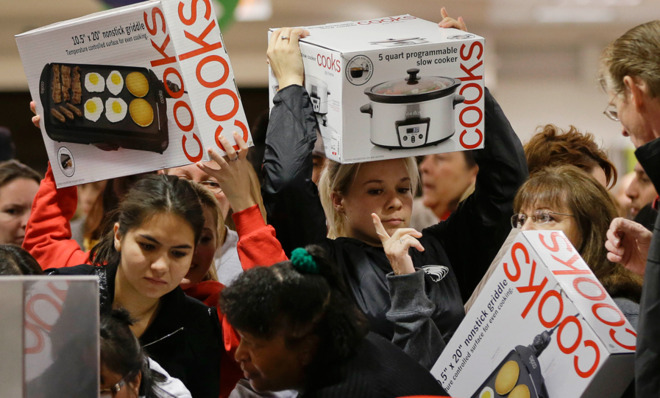A brief history of Black Friday
Close to 90 million Americans will shop on Black Friday this year. A look at how we got to this point.

A free daily email with the biggest news stories of the day – and the best features from TheWeek.com
You are now subscribed
Your newsletter sign-up was successful
We all know the basics about Black Friday: It's the day after Thanksgiving and one of the biggest shopping days of the year. But do you know where the term originated, or when Black Friday first became a thing?
The day after Thanksgiving has long been considered the start of the holiday shopping season, which is why since 1924, Santa Claus has been a huge part of the Macy's Thanksgiving Day Parade. Nothing can nudgingly remind you about all the presents left to buy for Christmas like Santa and the Macy's logo all over your television!
In fact, the weekend following Thanksgiving has marked the start of the holiday shopping rush for Americans since the 19th century. New York City's big department stores embraced the idea as a marketing gimmick in the early 20th century, staging events, releasing Christmas ads, and hosting parades, most notably Macy's annual blowout, which debuted in 1924.
The Week
Escape your echo chamber. Get the facts behind the news, plus analysis from multiple perspectives.

Sign up for The Week's Free Newsletters
From our morning news briefing to a weekly Good News Newsletter, get the best of The Week delivered directly to your inbox.
From our morning news briefing to a weekly Good News Newsletter, get the best of The Week delivered directly to your inbox.
The post-feast shopping frenzy quickly became so important to merchants that in 1939 they appealed to President Franklin D. Roosevelt to extend the buying period by moving up Thanksgiving. Roosevelt obligingly issued a presidential proclamation changing Thanksgiving to a week earlier, angering those who had already made travel plans and causing some to refer to the day as Franksgiving. You can read all about this debacle here.
In the '50s, people running factories started referring to the day after Thanksgiving as "Black Friday" because so many employees failed to show up for work. In the early '60s, Philadelphia police started using the term to refer to the onslaught of jaywalking shoppers who converged on the city's downtown. By the '70s, the name was more widely used to connote the kick-off of holiday shopping, but still bore negative connotations. It only took on a positive ring in the '80s, when some shop owners pointed out that the profitable post-Thanksgiving rush put "black ink" on their balance sheets for the first time all year.
Up until the last five years, most retailers opened for business at around 6 a.m. on Black Friday. But in 2011, big-box stores like Target, Best Buy, and Kohl's pushed back to midnight, and now several aren't even waiting for Friday, opting to open on Thanksgiving night.
In recent years, several major altercations have occurred across the United States on Black Friday, fueled by shoppers who have been waiting in long lines for limited items. In 2011, a woman pepper sprayed her fellow shoppers trying to purchase video games in a Los Angeles area Walmart, while in 2008, a Walmart worker in Long Island was knocked down and trampled to death by shoppers who broke down the store's doors.
A free daily email with the biggest news stories of the day – and the best features from TheWeek.com
According to the National Retail Federation, the number of shoppers on Black Friday has been steadily increasing, with 89 million going out on Black Friday in 2012, up from 86 million in 2011. Over last year's Black Friday weekend, they also spent a lot: The average shopper forked over $423, up from $398 in 2011.
Black Friday has also spawned two other days with fancy monikers. Cyber Monday, which began in 2005, brings incredible deals to online shoppers just three days after Black Friday. Giving Tuesday (now in its second year) hits the day after Cyber Monday, and is a national movement celebrating philanthropy.